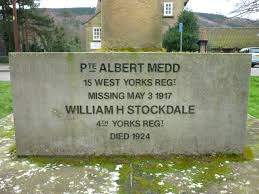Note: The numbers in the square brackets refer to the references which are listed on the Private Albert Medd - References page.
Albert Medd was born on 16th June 1883 in Ingleby Arncliffe, Yorkshire. His middle name on his birth certificate was Thompson [1], after his father George Thompson[5]; his middle name was not included on his baptism record[2], and it does not appear that he used it later in life. His mother was Elizabeth Medd, a domestic servant who lived in Ingleby Arncliffe[1]. It appears that his parents were not married.
In April 1891 Albert was living in Ingleby Arncliffe with 2 of his mother’s brothers. His mother was living somewhere else[3].
By April 1911 Albert’s mother had married John Johnson, and they were living in Middlestone, near Ferry-Hill, County Durham. Albert was living with them, and working as a road man[4].
Albert married Mary Bell, spinster of Ingleby Arncliffe, on 2nd July 1913. Albert was still living in Middlestone and working as a road man[5]. They had 2 children, John R Medd born in Auckland, County Durham in 1914 and Margaret D Medd born in Auckland, County Durham in 1915[6].
 Albert enlisted at Ferryhill, County Durham as a Private in the West Yorkshire Regiment (Prince Of Wales's Own)[7].
Albert enlisted at Ferryhill, County Durham as a Private in the West Yorkshire Regiment (Prince Of Wales's Own)[7].
On 3rd May 1917 Private Albert Medd was serving in the 15th Battalion (Leeds Pals), West Yorkshire Regiment (Prince Of Wales's Own). His service number was 33971[8][16]
A British offensive against the Germans north and east of Arras had started on 9th April 1917, and was to last until 16th May 1917. This was known as the Battle of Arras[9].
On 3rd May the 15th Battalion, West Yorkshire Regiment took part in a subsidiary battle about 5 miles north-east of Arras called the Third Battle of the Scarpe, which was timed to coincide with an Australian attack against the Germans further south at Bullecourt[9]
At 0345 hrs the battalion launched their attack on Gavrelle and Windmill trenches [10][11][12]. They faced heavy artillery and machine gun fire, and there were insufficient reserve troops to follow up and hold their gains. By 0730 hrs they had had to withdraw to their original front line[11]. Of the 547 men who started the attack, some 157 were fatalities, cut down by machine guns, 120 were missing and 120 were wounded[10].
Neither the British nor the Australians were able to make any significant advances and the attack was called off the following day after incurring heavy casualties[9].
Private Albert Medd is listed on Ingleby Cross Village War Memorial as Missing on 3rd May 1917.
He is listed by the Commonwealth War Graves Commission as having died on 3rd May 1917 at the age of 33[13][16]. He has no known grave, and his name “Medd A.” is commemorated on Stone No.9, Course “E”, Bay No.4 of the Arras Memorial to the Missing, France[14][15].
Photographs of the Arras Memorial to the Missing and Private Medd’s inscription, taken on 20th September 2018, can be found on the Memorial Visits page on this website.
The Arras Memorial is in the Faubourg-dAmiens Cemetery, which is in the Boulevard de General de Gaulle in the western part of the town of Arras. The cemetery is near the Citadel, approximately 2 kilometres due west of the railway station[17].
It is likely that Private Albert Medd was entitled to the Victory Medal, and very possibly the British War Medal, 1914-18[18].